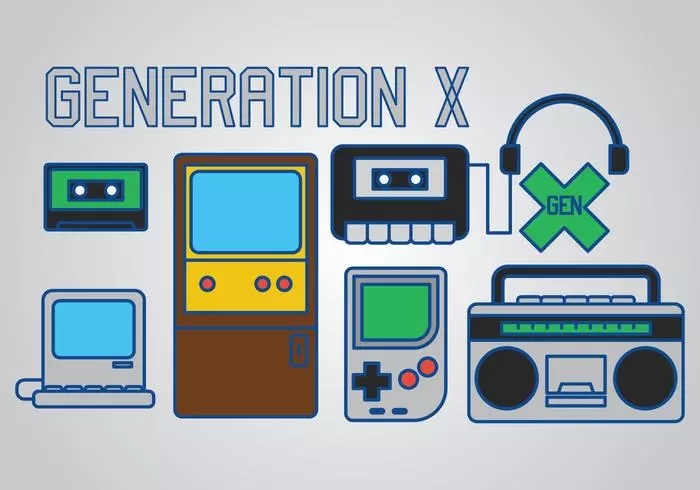漢語(yǔ)中用80后、90后、00后指在某一時(shí)期出生的人群,英語(yǔ)中也有這樣的詞匯,例如,Millennials指1981-1996年間出生的人,Generation X指1965-1980年間出生的人。
你知道這些稱(chēng)呼是怎么來(lái)的嗎?
BABY BOOMERS “嬰兒潮一代” (1946-1964)

Calling a dramatic increase in the number of children born a “baby boom” dates to the 19th century. In 1941, an issue of LIFE Magazine—discussing the increasing birthrate due to older couples having children after the Great Depression and the many marriages that came about because of the peacetime draft of 1940—proclaimed that “the US baby boom is bad news for Hitler.”
“嬰兒潮”指出生人口急劇增加,這種說(shuō)法可以追溯到19世紀(jì)。1941年,《生活》雜志的一篇文章稱(chēng),“美國(guó)嬰兒潮對(duì)希特勒來(lái)說(shuō)是壞消息。”這篇文章談到,年長(zhǎng)夫婦在大蕭條后生育子女以及1940年的和平草案后許多人成婚,導(dǎo)致出生率上升。
The children who would come to be known as Baby Boomers, however, wouldn’t be born for a few more years as soldiers returned home from the war and the economy “boomed.”
然而,又過(guò)了幾年,等戰(zhàn)爭(zhēng)結(jié)束士兵們返回家園,經(jīng)濟(jì)開(kāi)始“繁榮”后,那些被稱(chēng)為“嬰兒潮一代”的孩子才出生。
Although the children born from 1946 to 1964 get the name Baby Boomers, that phrase wouldn’t appear until near the end of the generation. In January 1963 the Newport News Daily Press warned of a tidal wave of college enrollment coming as the “Baby Boomers” were growing up.
盡管在1946-1964年出生的孩子被稱(chēng)為“嬰兒潮一代”,但這一短語(yǔ)直到這一代快結(jié)束時(shí)才出現(xiàn)。1963年1月,《紐波特紐斯日?qǐng)?bào)》的文章中警告稱(chēng),隨著“嬰兒潮一代”長(zhǎng)大,將掀起一股大學(xué)入學(xué)潮。
Oddly, an alternate name for people born during this time was Generation X; as London's The Observer noted in 1964, “Like most generations, ‘Generation X’—as the editors tag today’s under 25s—show a notable lack of faith in the Old Ones.”
奇怪的是,在這一時(shí)期出生的人還有另外一個(gè)名字,“X世代”;倫敦《觀察家報(bào)》1964年的文章中就曾寫(xiě)到,“和其他世代的人一樣,‘X世代’(注:當(dāng)今25歲以下的年輕人)明顯不夠相信神。”
GENERATION X “X世代” (1965-1980)

That comment in The Observer was in reference to a then-recently published book called Generation X by Jane Deverson and Charles Hamblett. A few years later, Joan Broad bought a copy at a garage sale, her son found it, and he fell in love with the name.
《觀察家報(bào)》的言論是參考了當(dāng)時(shí)簡(jiǎn)·戴佛森和查爾斯·哈姆布賴(lài)特出版的一本名為《X世代》的書(shū)。幾年后,瓊·博德在一個(gè)跳蚤市場(chǎng)買(mǎi)了這本書(shū)。她的兒子看到并愛(ài)上了這個(gè)名字。
That son was Billy Idol, and according to his memoir, Dancing with Myself, “We immediately thought it could be a great name for this new band, since we both felt part of a youth movement bereft of a future, that we were completely misunderstood by and detached from the present social and cultural spectrum. We also felt the name projected the many possibilities that came with presenting our generation’s feelings and thoughts.” The band Generation X would begin Billy Idol’s career.
這個(gè)男孩就是比利·愛(ài)多爾,根據(jù)他的回憶錄《自己跳舞》,“我們立刻想到這個(gè)名字可能非常適合這個(gè)新樂(lè)隊(duì),年輕的我們對(duì)未來(lái)感到渺茫,被完全誤解且脫離了當(dāng)下的社會(huì)和文化。我們也感覺(jué)到這個(gè)名字投射了許多可能展現(xiàn)我們這一代人的情感和思想的可能性。”樂(lè)隊(duì)“X世代”開(kāi)啟了比利·愛(ài)多爾的音樂(lè)生涯。
But the name Generation X wouldn’t become associated with a wide group of people until 1991. That's the year Douglas Coupland’s Generation X: Tales for an Accelerated Culture was released. The book became a sensation for its ability to capture early '90s culture and, although it didn’t coin the words, helped popularize a range of terms as diverse as McJob and pamphleting—and a name for an entire generation.
但直到1991,“X世代”才與更為廣泛群體聯(lián)系到一起。那一年,道格拉斯·柯普蘭的《X世代:速成文化的故事》出版了。這本書(shū)因充分展現(xiàn)了20世紀(jì)90年代早期的文化而轟動(dòng)一時(shí),盡管“X世代”這個(gè)詞不是它的發(fā)明,但這本書(shū)讓各種各樣的表述流行起來(lái),例如McJob(普通乏味而又低薪的工作),pamphleting(短論)和對(duì)一代人的稱(chēng)呼“X世代”。
MILLENNIALS 千禧一代 (1981-1996)

What comes after Generation X? Generation Y, obviously. That was the logic behind several newspaper columns that proclaimed the coming of Generation Y in the early '90s. But as psychologist Jean Twenge explained to NPR regarding the failure of “baby busters” as a term to describe Generation X, “Labels that derive from the previous generation don't tend to stick.”
“X世代”之后是什么?顯然是“Y世代”。這是幾十家報(bào)紙專(zhuān)欄的邏輯,他們將90年代初出生的人稱(chēng)為“Y世代”。但是心理學(xué)家珍·溫格在接受NPR采訪時(shí)提出,就像“生育低谷兒”并沒(méi)有被用來(lái)指代“X世代”一樣,“從上一代人衍生來(lái)的標(biāo)簽往往不能持久”。
Instead, in 1991 authors Neil Howe and William Strauss wrote Generations, which included a discussion about the Millennials. According to Forbes, they felt that as the oldest members of this generation were graduating high school in 2000—and everyone was focusing on the coming date—Millennials seemed a natural fit.
相反,在1991年,作家尼爾·豪依和威廉姆·施特勞斯的著作《世代》中提到了“千禧一代”。據(jù)《福布斯》報(bào)道,他們認(rèn)為,這一代人中年紀(jì)最大的將在2000年高中畢業(yè),而所有人都在關(guān)注新世紀(jì)的到來(lái),因此“千禧一代”似乎是很恰當(dāng)?shù)姆Q(chēng)呼。
(來(lái)源:中國(guó)日?qǐng)?bào)雙語(yǔ)新聞編輯部)
